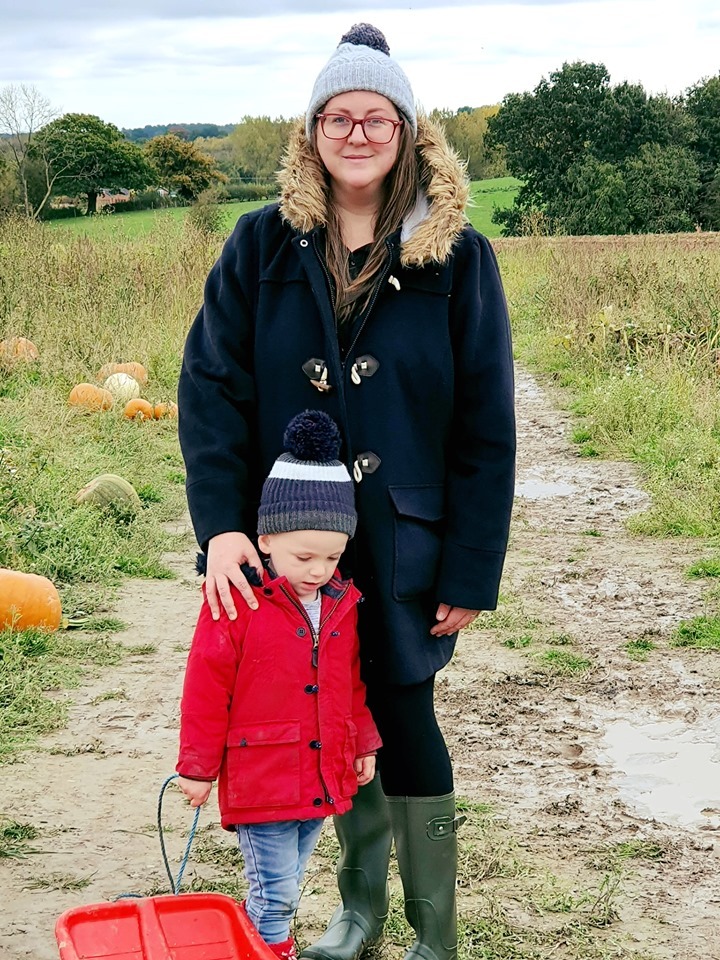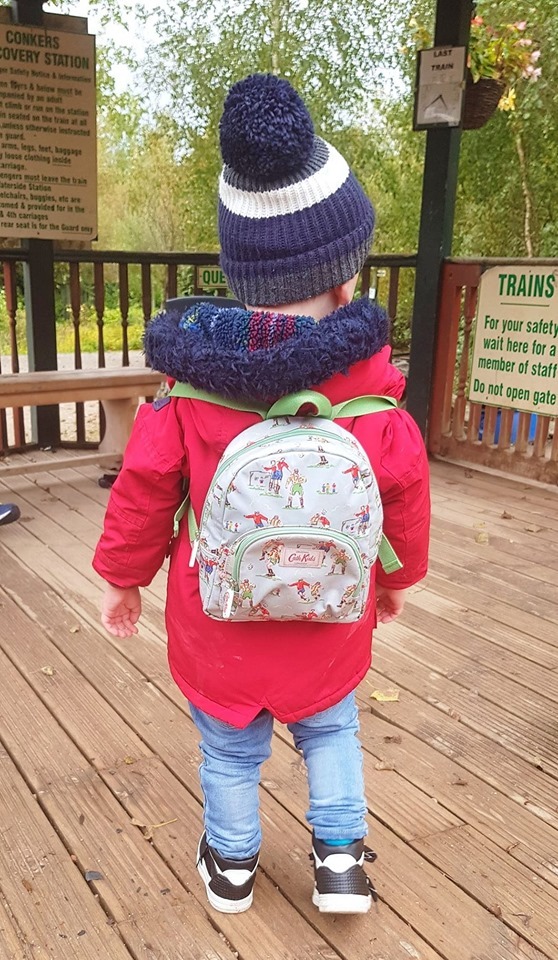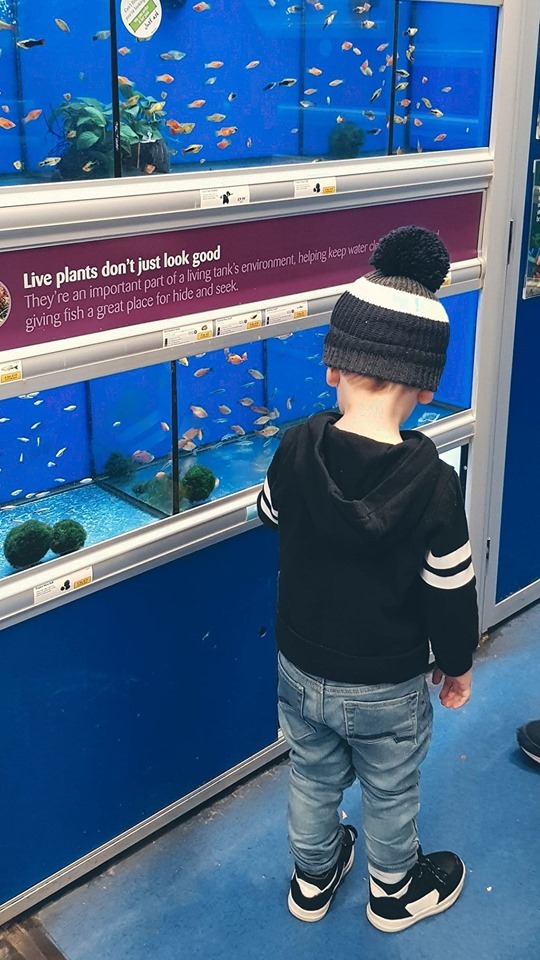

My three year old son is classed as ‘speech delayed’. I’m sure I’m not alone in this!
His nursery first started to raise concerns between the age of 18 months and 24 months… When tracking his developmental progress, whilst he was smashing his physical targets, there were some areas that were a cause for concern.
His speech and language attainment, and language comprehension were all lagging, and since this point, they have consistently been much slower to develop than other areas, and he’s approximately one third of his developmental age behind where he should be in these areas at the moment, although we predict that this will improve a lot over the next few months if his recent development is anything to go by…

Waiting for the choo choo…
Firstly, it’s important to remember that…
- They all speak at different stages but it’s good to speak to a professional if your child is not meeting their milestones.
- There are ways that you can help your little one, so don’t stress!
- Identifying a speech delay or other condition is not unduly ‘labelling’ your child, it will help them to access support.
- As long as your child is happy, healthy and loved, it’s all good. Speech delay is treatable!
Identifying Max’s Speech Delay
I’ll admit, as a parent I was in denial for a while. I put it down to ‘children develop at their own paces’. Whilst this is technically true, time passed and he just didn’t catch up. At this point, we contacted our Health Visitor.
She came to visit us at our home and did some observations, agreeing that yes, Max had a speech delay. We spoke to nursery, and so did our Health Visitor, who agreed to put him on the ECAT programme – ‘Every Child a Talker’. This involved spending 1:1 time with the SENCO and working on activities to encourage speech, and improve his comprehension.
The ECAT programme, whilst definitely setting the foundations to speech, didn’t work as well as expected. By the point that we came to this conclusion, nursery and ourselves were already becoming concerned with other areas of development; it became apparent that Max is likely to be on the autistic spectrum (no surprise, as I’m diagnosed, and we have diagnosed relatives on my husbands side of the family). We were referred for an assessment (12 month wait) and access to SALT – Speech and Language Therapy. Some areas allow you to self refer for SALT, mine doesn’t.
We are still waiting for SALT, but we’ve been working really hard at home to boost Max’s speech which has worked wonders, so we’ll share what we’ve been doing further on…

We sang ‘Baby Shark’ when we went to look at the fish… So now Max thinks that fishes are called ‘baby’! Oops.
Other Factors That Can Cause Speech Delay
Firstly, let me make it clear so that none of our lovely readers worry; speech delay can come hand in hand with autism and other conditions but not exclusively! There are loads of things that can impact a child’s speech and language development;
- Developmental factors; Autism and other learning disorders such as Auditory Processing Disorder.
- Hearing problems.
- Visual problems.
- Apraxia of speech.
- Being a ‘late bloomer’ or a child who has hyperfocused on other areas of development first.
Helping To Support Max’s Speech
We realised that we could be talking to Max more, and more clearly too. We decided to take a look at how we could encourage Max’s language development through ‘modelling’ our own speech and language to him….
- We started to speak more slowly and more clearly – it’s easy to get into bad speech habits if you and your partner understand each other easily, but little ears may not!
- We started to speak to Max directly more and have ‘pretend’ conversations when he would babble back at us, to help him to learn about the ‘cadence’ of normal conversation.
- We started to give every object a name when handling it. Food, drinks, clothes, body parts etc. We found that he learned colours and numbers from 1 to 10 very quickly with this method!
- Reading to him more daily.
- Singing to him more.
- Narrating every action; ‘we’re putting on your shoes now!’, or ‘let’s go and cook dinner.’
- Giving him a choice between things so that he has to vocalise what he wants.
- Keeping him active, engaged and stimulated as much as possible, even when we are tired.
They might seem common sense or like things you’d automatically do but it’s honestly very easy to slip into habits where you don’t think twice and don’t realise that your child isn’t automatically and innately picking up language from you until problems become apparent. Parenting is hard, and there is so much to think about! We strongly encourage other parents to copy these tips, as they’ve made such a difference.

Taking Max out and about to keep him engaged really helps to encourage his speech!
Hopes For The Future
Max is now hovering at around 24 months in terms of his speech and language; he is 38 months old currently, so we do have more progress to make, and we hope that SALT will be instrumental in bridging that gap. Recently, we’ve been hearing…
- My juice/more juice
- All gone
- Baby
- Oh no
- Oh my god/gosh
- Oh my god, cake!
- Choo choo
- Cake
- Pizza
- Bed
- Socks/shoes/hat/coat
- Body parts
- Numbers 1-10
- Colours
- Blue/red/grey/black/green/white car
- Mummy, daddy, nanny, grandad, Max
- Cat
- Neigh
- Cookie
- Biscuit
- Car
- No
- You ok?
- I’m ok
- Bye poo poo!
- Ew, poo poo!
- Bye wee wee!
- Bye mummy
- Bye daddy
- My mummy/daddy
- Banana
- Hot
- Cup of tea
- Tea
- Oh dear
- Thank you
He also understands more words and phrases that he can’t vocalise himself just yet.
After so long with so little speech, me and my husband are so relieved that Max seems to have found his sweet little voice. To anyone else in our position, please don’t stress yourself out or beat yourself up. It isn’t your fault, and there are so many things that you can put in place to support your little one in finding their voice.
Don’t hesitate to reach out to your childcare provider and Health Visitor; you’ve got this!
Love from Katie, Toby & Max. Xx


.png)






.jpg)
